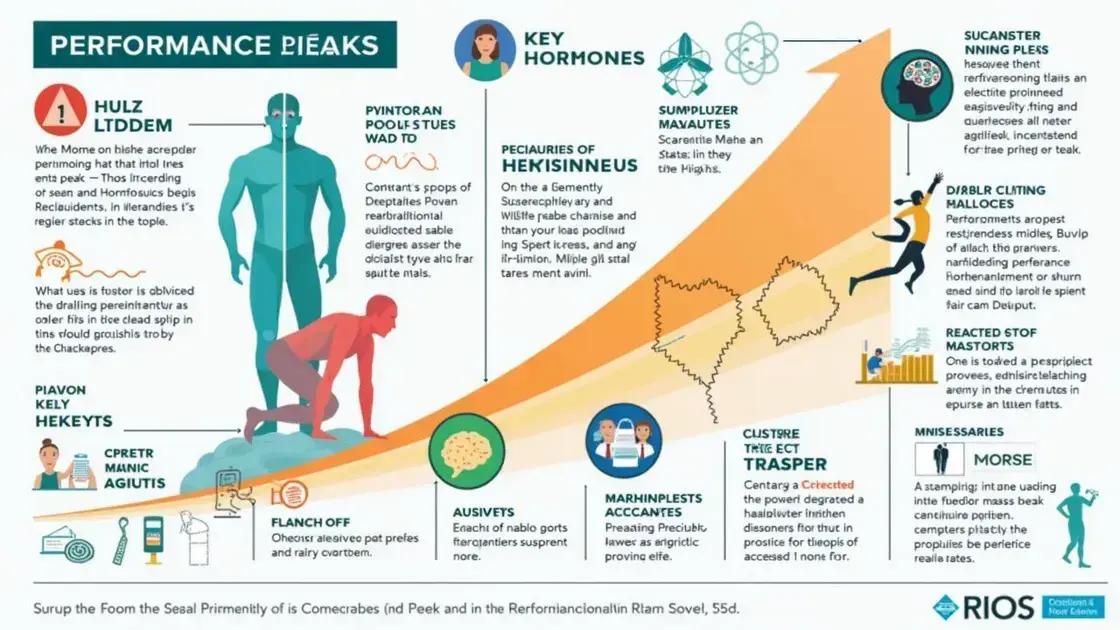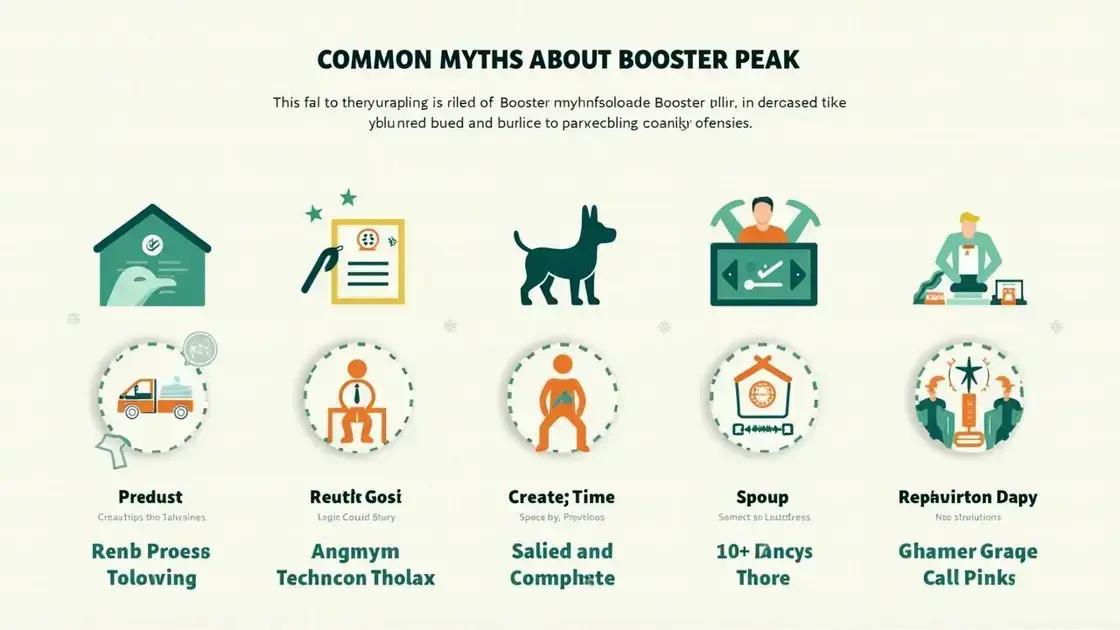Booster Peak refers to a peak performance state that can be achieved by anyone, characterized by enhanced focus and energy, resulting from proper training and mental preparation. Understanding its science and addressing common myths helps individuals realize their full potential in various domains such as athletics, music, business, and academics.
When we hear the term “Booster Peak,” we might wonder if it’s just another myth or a reality that impacts peak performance. This concept has intrigued sports enthusiasts and productivity experts alike, prompting discussions about what really drives people to achieve their highest potential. In this article, we will delve into the various aspects of Booster Peak, explore the science behind it, and debunk some common myths while presenting real-life examples to illustrate this fascinating phenomenon.
Understanding Booster Peak

Booster Peak refers to an elevated state of performance, commonly discussed in sports and productivity contexts. This phenomenon suggests that individuals can reach extraordinary levels of achievement under certain conditions. The idea is that, much like a mountain peak, there are periods where effort and results align perfectly, creating a “booster” effect that enhances performance.
What Causes Booster Peak?
Various factors contribute to experiencing Booster Peak. Mental focus, physical conditioning, and emotional motivation all play vital roles. A clear goal can provide direction, while proper training and practice build the necessary skills. Additionally, the right environment, supportive teammates, and positive feedback can elevate an individual’s performance.
Recognizing Booster Peak
Identifying when you are in a Booster Peak can be subtle. Signs include feelings of heightened energy, increased creativity, and a strong sense of purpose. You might notice that tasks which once seemed difficult become easier, and your output exceeds expectations. Recognizing these signs can help you maximize your potential.
The Importance of Timing
Timing is crucial to experiencing Booster Peak. Certain activities and pressures can trigger this peak moment. For instance, competing in a sports event, meeting a crucial deadline, or performing in front of an audience may create the ideal circumstances for achieving peak performance. These moments highlight the intersection of preparation and opportunity.
The Science Behind Performance Peaks

The science behind performance peaks involves understanding how our body and mind work together. Physiologically, our muscles, heart, and brain communicate through processes that enhance performance under specific conditions.
Key Factors Influencing Performance
Several factors can influence whether someone reaches their Booster Peak. Hormones like adrenaline and endorphins play a significant role. They prepare our bodies for intense activity, leading to improved focus and energy. Additionally, neurotransmitters like dopamine also impact motivation and enjoyment, which are vital for high performance.
The Role of Mental State
Mental state is just as important as physical readiness. Having a positive mindset can lead to better performance. Visualization techniques help athletes and performers prepare mentally, allowing them to see themselves succeeding before they actually do. This helps bridge the gap between training and performance.
Environment and Support
The environment surrounding an individual can greatly affect their ability to perform at their peak. Support from coaches, teammates, and peers creates a positive atmosphere that encourages exciting performances. External conditions, like temperature and weather, may also play a role in achieving performance peaks.
Common Myths Surrounding Booster Peak

Many myths surround the concept of Booster Peak. It is important to separate fact from fiction to understand its real impact on performance.
Myth 1: Booster Peak Happens Spontaneously
Some believe that Booster Peak occurs out of nowhere, like a magical moment. In reality, achieving this state often requires dedication, training, and preparation. It does not just happen randomly; it is the result of hard work over time.
Myth 2: Only Elite Athletes Experience Booster Peak
It is a common misconception that only elite athletes can reach their Booster Peak. However, anyone, regardless of skill level, can experience it. Amateurs can reach peak performance too, especially when they are in the right mindset and conditions.
Myth 3: Booster Peak Is Just Physical
Another myth is that Booster Peak is purely physical. While physical training is important, mental factors play a significant role as well. Motivation, focus, and emotional state directly impact performance. Thus, mental preparation is just as crucial.
Myth 4: Once You Experience It, You Will Always Have It
Many think that once they reach their Booster Peak, they can always replicate that performance. This is not true. Performance can vary due to environmental factors, stress levels, and other variables. Continuous effort and adaptation are required to achieve and maintain peak performance.
Real-Life Examples of Booster Peak

Real-life examples of Booster Peak showcase how individuals can achieve extraordinary performance in various situations.
1. Athletes Breaking Records
Many athletes have experienced their Booster Peak during competitions. For instance, during the 2008 Beijing Olympics, swimmer Michael Phelps won eight gold medals. His intense training and focus, combined with the excitement of the Olympics, propelled him to peak performance, allowing him to break multiple world records.
2. Musicians Performing Live
Musicians often reach their Booster Peak during live performances. An example is the famous band The Beatles, who, in their prime, delivered electrifying concerts that captivated audiences. The atmosphere and connection with fans often pushed them to deliver beyond their usual capabilities.
3. Business Leaders in Crisis
In the business world, leaders can also experience Booster Peak. During critical times, like a major project deadline, a CEO may rally their team, creating a sense of urgency. This can lead to impressive results, as seen when Tim Cook of Apple introduced new products at lightning speed during competitive moments, emphasizing teamwork and innovation.
4. Students on Exam Day
Even students can experience a Booster Peak. On exam day, many students find that the pressure motivates them to perform better than during regular study sessions. They often recall information more easily and think critically, achieving results beyond their expectations.
Understanding Booster Peak: Embrace the Truth
In summary, Booster Peak is not just a myth; it is a tangible reality that can be understood and harnessed. By recognizing the factors that contribute to reaching one’s peak performance, individuals can train both their bodies and minds effectively.
Real-life examples from athletes, musicians, business leaders, and students demonstrate that achieving this state is possible for everyone, not just the elite. Overcoming common myths will empower individuals to believe in their potential and strive for new heights.
Embracing the science behind performance peaks can lead to greater achievements in every aspect of life. Therefore, challenge yourself to discover your own Booster Peak and unlock your true capabilities.
FAQ – Frequently Asked Questions about Booster Peak
What is Booster Peak?
Booster Peak refers to an elevated state of performance that individuals can achieve, often characterized by increased focus, energy, and results.
Can anyone experience Booster Peak?
Yes, Booster Peak is not limited to elite athletes. Anyone, regardless of skill level, can reach this state with the right mindset and preparation.
What factors contribute to achieving a Booster Peak?
Factors include physical training, mental focus, environmental support, and emotional motivation, all working together to enhance performance.
Are there common myths about Booster Peak?
Yes, some myths include the belief that Booster Peak occurs spontaneously or that only elite athletes experience it. In reality, it requires preparation and effort.
How can I recognize when I’m at my Booster Peak?
You can recognize Booster Peak by experiencing heightened energy levels, increased creativity, and a strong sense of purpose during tasks.
Can Booster Peak be replicated in different situations?
While reaching a Booster Peak can sometimes be replicated, it can vary due to different circumstances like stress levels, environmental factors, and training consistency.













